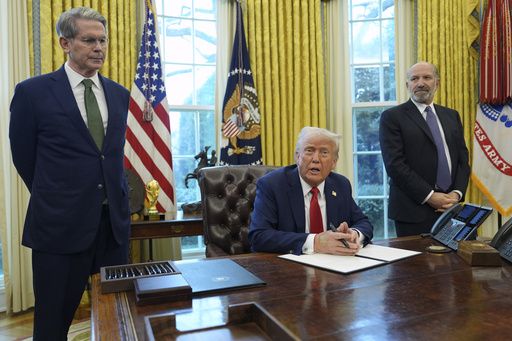
WASHINGTON — In order for President Donald Trump and congressional Republicans to push forward their legislative objectives, they face an important task: finalizing the spending bills for the current budget year. Unfortunately, this endeavor is reportedly facing significant challenges.
The existing temporary funding measure will expire on March 14. If Congress fails to enact new legislation by that time, a partial government shutdown is expected to occur.
Five weeks might seem ample time to address the budget, but in Washington, such a period can feel prolonged and highly uncertain, especially as tensions have escalated between political parties during Trump’s early administration. The new administration is altering agency focuses and pushing for the dismantling of pre-existing programs without necessary approvals from Congress.
Currently, talks regarding the spending bills are stalled. In late January, leaders from both Republican and Democratic appropriations committees engaged in discussions that appeared productive. However, that initial optimism has since diminished. House Majority Leader Steve Scalise indicated that the Democrats seem to have retreated from negotiations, a sentiment shared by House Speaker Mike Johnson. Johnson believes the comments made by House Democratic leader Hakeem Jeffries suggest an intention to instigate a government shutdown, characterizing it as unfortunate. His hope is for negotiations to resume, as responsiveness from Democrats has reportedly waned over recent days.
On the other side, Rep. Tom Cole, who heads the House Appropriations Committee, referenced recent communications with Democratic lawmakers that contradict claims of a complete withdrawal from discussions. He voiced his disappointment, noting the lack of progress towards a resolution.
Democratic leaders strongly disagree with the portrayal that they have stepped back from negotiations. Rep. Rosa DeLauro, the chief Democrat on the House Appropriations Committee, firmly stated that Democrats are still engaged in the process. Jeffries further emphasized that DeLauro has kept the lines of communication open with Republicans and expressed hope that they would prioritize the general public’s interests rather than those of wealthy donors in reaching an agreement.
The negotiations are increasingly strained over the spending levels set forth in a previous agreement made by former Speaker Kevin McCarthy and then-President Biden. This agreement included a stipulated increase of 1% for defense and nondefense spending for the ongoing budget year, approximating $895.2 billion and $780.4 billion, respectively. While Democrats assert that the agreement should be upheld, Republican sentiments differ. Cole pointed out that the current political dynamics have shifted, and previous agreements made under a Democratic administration are no longer prevailing.
Moreover, Democrats are navigating a rapidly evolving situation in which government operations are in a state of disruption. Concerns regarding government services persist as the administration, under Trump’s guidance, has prompted the resignation of numerous workers and implemented significant agency changes, with even figures like Elon Musk influencing federal operations.
Sen. Patty Murray, a leading Democrat on the Senate Appropriations Committee, lamented the diminishing trust among lawmakers and called upon Republicans to assure that any agreement reached would be honored. DeLauro echoed those sentiments, stressing the importance of fostering trust in the negotiations.
Should Congress fail to establish a comprehensive spending plan, there exists the possibility of enacting another temporary funding measure to keep the government functioning for additional weeks or months while disagreements are resolved. Known as continuing resolutions (CRs), these measures would extend current funding levels for government programs and agencies. However, Cole expressed a strong preference for avoiding a CR altogether while acknowledging its necessity over a potential shutdown.

